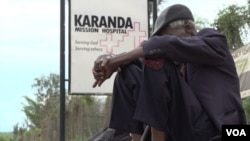With no end in sight to the Zimbabwe doctors strike over salaries and poor working conditions, desperate patients have looked to church-run mission hospitals for much-needed health care.
One such facility, Karanda Mission Hospital, about 200 kilometers north of Harare, is overwhelmed by patients seeking treatment.
This Evangelical Church-run hospital was established in the 1960s to cater for patients in the Mount Darwin district of Zimbabwe. But because of the doctors strike, which began three months ago, people like Darlington Handerson, 39, are traveling hundreds of kilometers to be treated here.
Handerson, who has a broken hip, said he arrived more than two weeks ago. The place is flooded with people, he said. Handerson was told he would be seen on November 29, but doctors said they had more urgent cases, so he was told to come back this week. He was further told that if he didn’t receive treatment this week, it wouldn’t happen until January.
Canadian Dr. Paul Thistle, the head of Karanda Mission Hospital, said its patient numbers had more than doubled in the last two months.
"That quite stresses on our resources — our doctors, nurses, medicines, our surgical supplies,” Thistle said. “Karanda is probably seen as the port of last hope for some people who have failed to access services elsewhere in the country. As you can see by the queues, some people may wait for three days to get seen by a doctor.
“If someone is really sick, we move them up to the front of the line. But it is sometimes very difficult to assess how sick people are, because everybody outside is unwell."
Mercy Taderera recently traveled 300 miles to the hospital with her daughter Tanatswa Mapfupfu, 13, who had a bladder infection. Even so, they had to wait to see a doctor.
"I wish they would value people's lives,” Taderera said of President Emmerson Mnangagwa's government and the doctors on strike. “So many people have died because of the doctors strike. This is an appeal to both: The government must attend to the doctors' concerns."
Over the years, international aid organizations have funded Zimbabwe's neglected social sector. But that help has largely consisted of providing drugs and technical support. There’s been no help on salaries, which the doctors want increased to cope with soaring inflation.
Dr. Alex Gasasira, the World Health Organization representative to Zimbabwe, is hoping the country's officials and doctors find a solution to end the strike.
"We are very worried that the most vulnerable will not access the care they need,” he said. “We have been following the discussions. We are hopeful that consensus will be reached [and] the health workers can be back on duty within the shortest possible time, because the poor and the most vulnerable are the ones most affected by this impasse."
That surely would be a relief to workers here and patients going for days without treatment as the doctors strike drags on.




